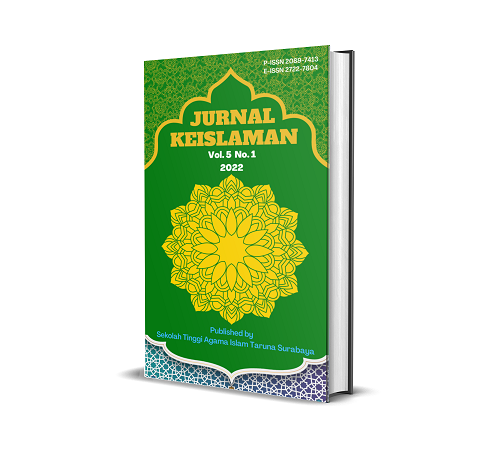PENINGKATAN HASIL BELAJAR MATA PELAJARAN SEJARAH KEBUDAYAAN ISLAM MELALUI PENERAPAN METODE DISKUSI JENIS BUZZ GROUP
Abstract
AbstractThis research aims to find out the results of studying Islamic Cultural History students of class XI Madrasah Tsanawiyah Islamiyah Syafiiyah GandrirojoSedan Rembang in the 2020/2021 school year. This research was carried out with two cycles that began with conducting a pre-test to find out the achievements of learning the History of Islamic Culture before the implementation of this type of learning with discussion. Each cycle consists of four stages: planning, implementation, observation and evaluation. The data collection techniques used are observation, tests and documentation. The data obtained is analyzed using the percentage method. The achievement of studying history in students of class IX Tsanawiyah Islamiyah Syafiiyah Gandrirojo Sedan Rembang in the 2020/2021 school year has increased. This is known from the results of the Pre Test before using the method, the average student value is 5.94 then after applying the learning method in both cycles increased to 7.20 Achievement is also seen from the presentation of students who get complete grades, from the results obtained by students while still using the tutorial method is 5 students, while after using the Buzz Group Type Discussion Method increased to 16 students. There is an increase in the achievement of History learning outcomes in students of class IX Tsanawiyah Islamiyah Syafiiyah GandrirojoSedan Rembang in the 2020/2021 school year.AbstrakPenelitian ini bertujuan untuk mengetahui hasil belajar Sejarah Kebudayaan Islam siswa kelas XI Madrasah Tsanawiyah Islamiyah Syafiiyah GandrirojoSedan Rembang tahun pelajaran 2020/2021. Penelitian ini dilaksanakan dengan dua siklus yang diawali dengan melaksanakan pre test guna mengetahui prestasi belajar Sejarah Kebudayaan Islam sebelum diterapkannya jenis pembelajaran dengan diskusi. Setiap siklus terdiri dari empat tahap yakni tahap perencanaan, pelaksanaan, observasi dan evaluasi. Adapun teknik pengumpulan data yang digunakan adalah observasi, tes dan dokumentasi. Data yang diperoleh dianalisis menggunakan metode persentase. Prestasi belajar sejarah pada siswa kelas IX Tsanawiyah Islamiyah Syafiiyah Gandrirojo Sedan Rembang tahun pelajaran 2020/2021 mengalami peningkatan. Hal ini diketahui dari hasil Pre Test sebelum menggunakan metode tersebut, nilai rata-rata siswa adalah 5,94 kemudian setelah diterapkan metode pembelajaran tersebut pada kedua siklus mengalami peningkatan yaitu menjadi 7,20 Prestasi juga terlihat dari presentasi siswa yang mendapatkan nilai tuntas, dari hasil yang diperoleh siswa pada saat masih menggunakan metode tutorial adalah 5 siswa, sedangkan setelah menggunakan Metode Diskusi Jenis Buzz Group meningkat menjadi 16 siswa. Ada peningkatan prestasi hasil belajar Sejarah pada siswa kelas IX Tsanawiyah Islamiyah Syafiiyah GandrirojoSedan Rembang tahun pelajaran 2020/2021.References
Asrori, Muhammad ( 2008 ). Penelitian Tindakan Kelas. Bandung: Wacana Prima.
Budiningsih, Asri ( 2005 ). Belajar Dan Pembelajaran. Jakarta: Rineka Cipta.
Nata, Abudin ( 2010 ). Metodologi Studi Islam. Jakarta: Raja Grafindo Persada.
Suhardjono, dkk. ( 2007 ). Penelitian Tindakan Kelas. Jakarta: Bumi Aksara.
User & Lilis ( 2003 ). Upaya Optimalisasi Kegiatan Belajar Mengajar. Bandung: Rosdakarya.
Wardani, Igak, dkk. ( 2007 ). Penelitian Tindakan Kelas. Jakarta: Universitas Terbuka Departemen Pendidikan Nasional.
Copyright (c) 2022 Lailatu Zahroh, Irfan Mawardi

This work is licensed under a Creative Commons Attribution-ShareAlike 4.0 International License.
Authors who publish with this journal agree to the following terms:
- Authors retain copyright and grant the journal right of first publication with the work simultaneously licensed under a Creative Commons Attribution-ShareAlike that allows others to share the work with an acknowledgement of the work's authorship and initial publication in this journal.
- Authors are able to enter into separate, additional contractual arrangements for the non-exclusive distribution of the journal's published version of the work (e.g., post it to an institutional repository or publish it in a book), with an acknowledgement of its initial publication in this journal.
- Authors are permitted and encouraged to post their work online (e.g., in institutional repositories or on their website) prior to and during the submission process, as it can lead to productive exchanges, as well as earlier and greater citation of published work (See The Effect of Open Access).






















